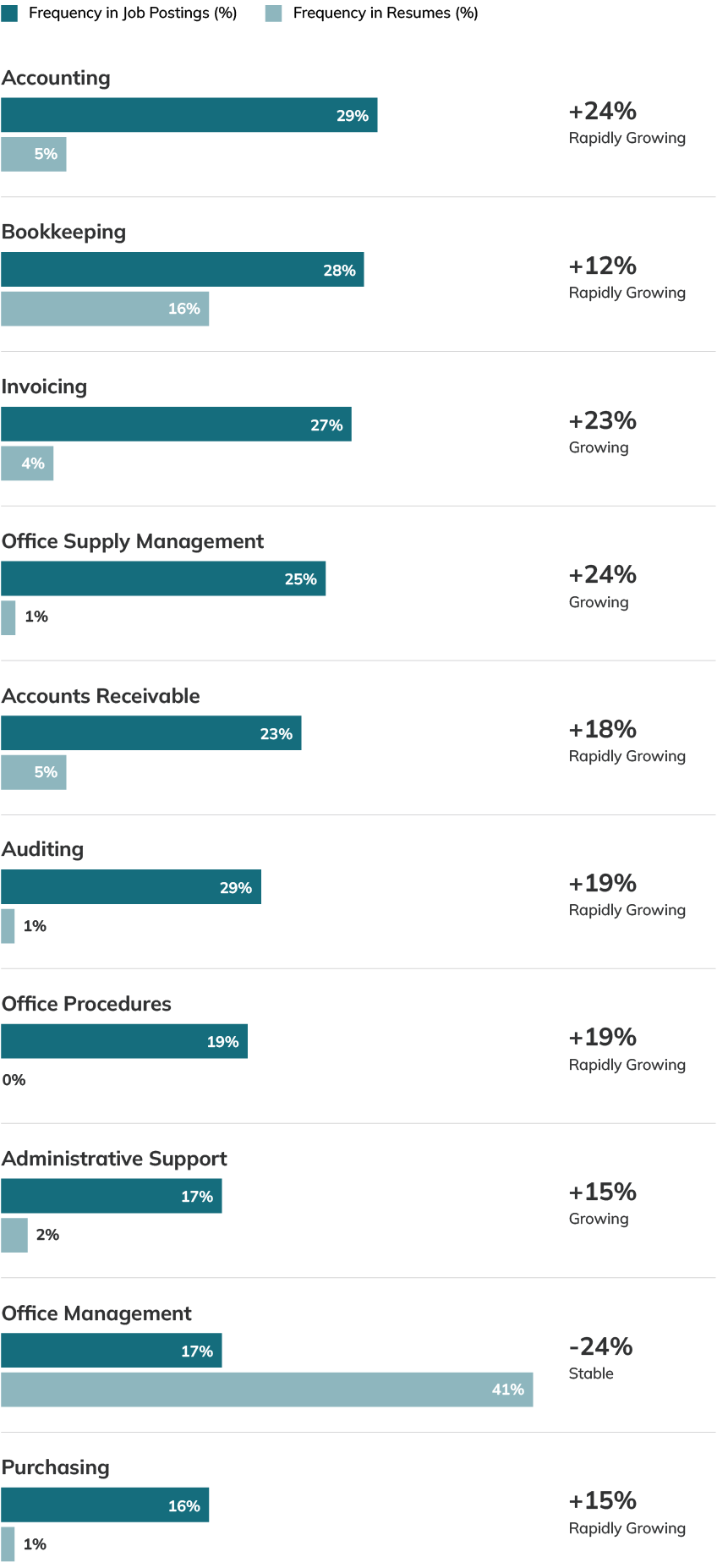
Navigating Office and Support Workforce Challenges in Montana
As Montana’s economy continues to grow, the demand for skilled office and support workers has surged, placing significant pressure on employers across the state. Utilizing robust workforce data tools, we have analyzed the current trends and challenges facing this sector to provide a comprehensive overview of the workforce landscape.
High Job Competition
Montana’s office and support job market is highly competitive. Between January and May 2024, there were 721 unique job postings for roles such as administrative assistants and bookkeepers, with postings typically lasting 21 days. Overall Montana had 33,000 job openings in April 2024, maintaining a job openings rate of 5.9% (BLS Gov). This indicates strong competition among employers to fill these positions, supported by the fact that the ratio of unemployed persons per job opening in Montana was 0.5, significantly lower than the national ratio of 0.8 (BLS Gov). The low ratio highlights the tight labor market, emphasizing the need for employers to differentiate themselves to attract talent.
Rising Salaries
According to LC Staffing’s workforce dataset, Montana salaries for office and support positions have seen a notable increase. The median advertised wage is now $19.63 per hour, reflecting a 21.5% rise over the past three years, from $16.06 in 2021. This increase underscores the growing demand for skilled office and support workers and the necessity for employers to offer competitive wages to attract and retain talent.
A similar increase has occurred nationally. Administrative assistant wages have increased by approximately 22.7% over the past three years, from $16.00 per hour in 2021 to $19.63 per hour in 2024. Bookkeeper wages have risen by about 22.6% during the same period, from $17.00 per hour in 2021 to $20.85 per hour in 2024. These increases highlight the substantial growth in compensation for these roles (Bureau of Labor Statistics) (BLS Gov).
This trend indicates that employers may not fully realize how much wages have risen until they face turnover and must compete for new hires at current market rates. As a result, companies that fail to adjust their compensation strategies may find it difficult to attract and retain qualified employees.
Skill and Experience Gaps
The office and support workforce in Montana requires specific skills that are in high demand, but there is a significant discrepancy between skill sets mentioned in job postings and those in candidate resumes. According to LC Staffing’s workforce dataset, accounting skills are required in 29% of job postings but are only present in 5% of candidate resumes. Similarly, bookkeeping skills appear in 28% of job postings but only in 16% of resumes, and invoicing skills are needed in 27% of postings but found in only 4% of resumes.
This gap highlights the challenges employers face in finding candidates with the necessary skills. It underscores the importance of career pathing and retention strategies. Employers need to invest in training programs to help current employees develop these in-demand skills. Additionally, providing clear career progression opportunities can help retain employees and reduce the skills gap.
Top Specialized Skills Table
This table illustrates the discrepancies between job postings and candidate profiles for key skills. Employers must recognize these gaps and take proactive measures to train existing employees and create pathways for skill development.
Regional Hiring Challenges
The average time to fill office and support positions in Montana is 21 days. However, this figure varies significantly across different cities. In Billings, Kalispell, and Missoula, the average posting duration extends to 28 to 30 days. This regional variation underscores the unique challenges faced by employers in these areas.
For employers, having to wait 30 days to hire an administrative assistant, bookkeeper, or supervisor can have significant implications. Extended hiring times can lead to increased workloads for existing staff, potential delays in operations, and reduced overall productivity. Moreover, prolonged vacancies can affect team morale and customer service quality, as remaining employees may struggle to cover additional responsibilities.
Employers in regions with longer hiring durations must implement strategies to mitigate these impacts. This might include offering competitive salaries, enhancing job postings to attract more candidates, and working with staffing agencies like LC Staffing to expedite the hiring process.
Common Challenges
- Labor Shortage: Montana is experiencing a general shortage of workers across various sectors. The state’s low unemployment rate and high job openings make it difficult for employers to find and hire qualified candidates, increasing competition for the limited available talent.
- Skill Gaps: There is a significant gap between the skills employers need and those available in the workforce, particularly in accounting, bookkeeping, and invoicing.
- Geographic Disparities: While cities like Billings and Bozeman have higher concentrations of job postings, rural areas struggle to attract skilled workers, causing delays and increased costs in less populated regions.
- Retention Issues: High competition among employers leads to frequent job changes and workforce instability, disrupting project continuity and increasing recruitment costs.
- Outdated Recruitment Practices: Many companies are behind the curve when it comes to modern recruitment methods. Utilizing digital platforms, social media, and other contemporary recruitment tools is essential for reaching a broader and more diverse pool of candidates.
LC Staffing’s Role
LC Staffing, with a deep understanding of Montana’s job market, offers strategic solutions to these challenges. We provide wage benchmarking data to help employers stay competitive, leverage an extensive candidate database to source qualified talent, and offer temporary workforce options to manage employment needs effectively. Our consultative approach ensures that businesses can attract and retain the best office and support talent in Montana.

